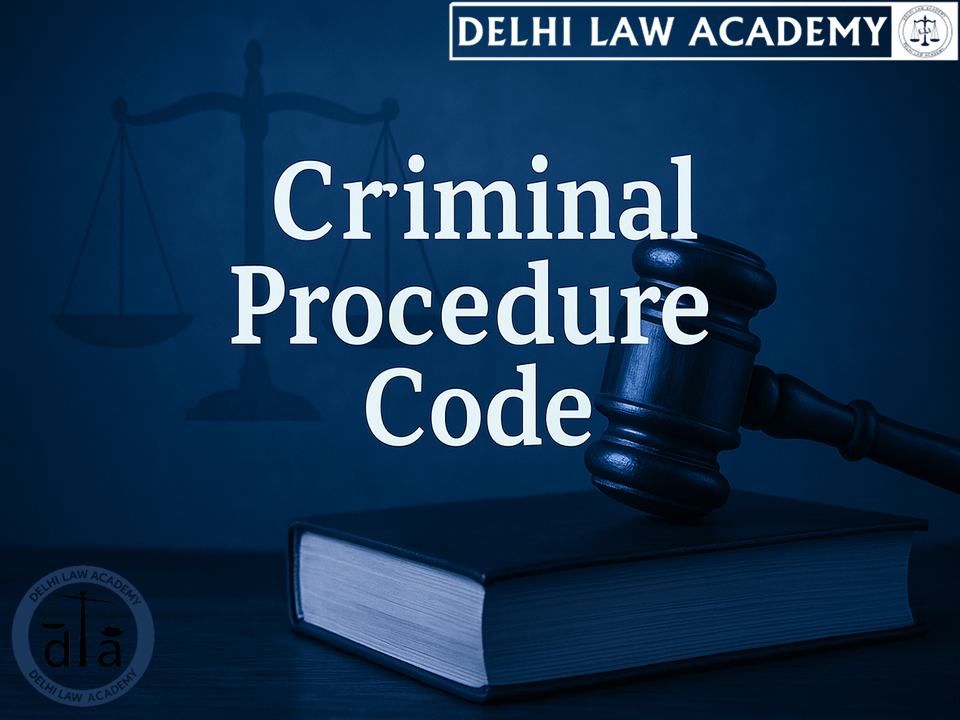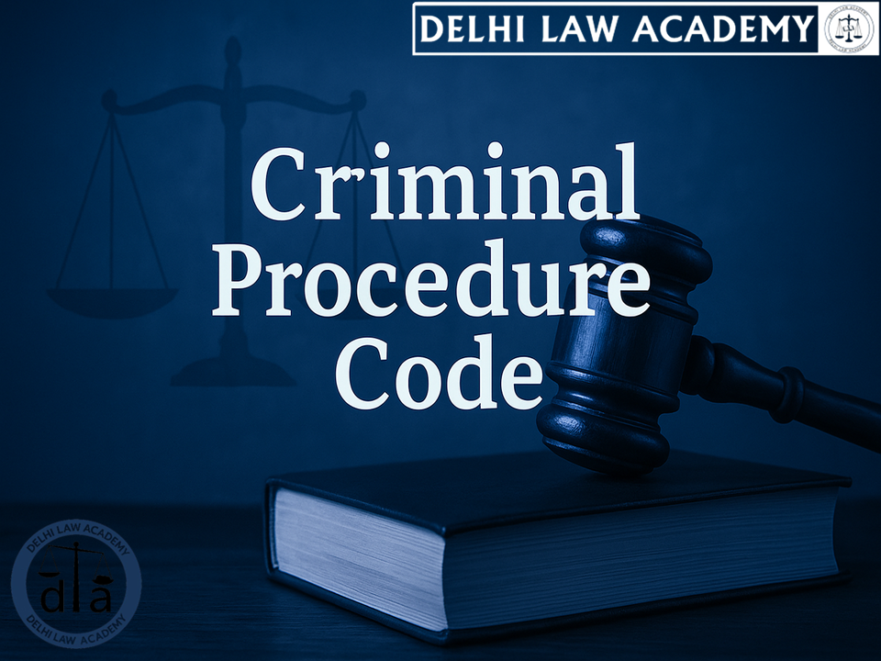
⚖️ CrPC Test 4 [Fully Solved] | Judicial Service Exams
Preparation for RJS, DJS, PCS(J) and other Judicial Exams
📘 Preparation for Judicial Service Exams
The Criminal Procedure Code forms the bedrock of civil law. Its thorough knowledge is a must for all aspirants of RJS, DJS, PCS(J) or any other Judicial Service exam for that matter.
To help such aspirants, Delhi Law Academy Jaipur has launched a series of fully solved tests on all important aspects of this vital part of their syllabus:
📝 CrPC Test 4 [Fully Solved]
Q 41: The Criminal Procedure Code provides for either no appeal or only one appeal against an order of conviction. Elucidate. [10 marks]
Ans:
Section 374(1)
• Any person convicted on a trial held by a High Court in its extraordinary original criminal jurisdiction may appeal to the Supreme Court
• Any person convicted on a trial held by a Sessions Judge or ASJ may appeal to the High Court
• Any person convicted on a trial held by any other Court [i.e. a Magistrate’s court] passing a sentence of imprisonment of more than seven years against him or against any other person convicted at the same trial may appeal to the High Court
• Any person convicted by a Metropolitan Magistrate or Magistrate of first class or of second class with a sentence of imprisonment of upto 7 years may appeal to the Court of Session
Section 375: No appeal when accused pleads guilty
• Where an accused person has pleaded guilty and has been convicted on such plea there shall be no appeal
o if conviction is by High Court
o if conviction is by a Court of Session or a Magistrate except as to the extent or legality of sentence
Section 376: No appeal in petty cases
There shall be no appeal by a convicted person:
• where a High Court passes only a sentence of imprisonment not exceeding six months or of fine not exceeding 1000 rupees…
• where a Court of Session or a Metropolitan Magistrate passes only a sentence of imprisonment not exceeding three months or fine not exceeding 200 rupees or of both
• where a Magistrate of first class passes only a sentence of fine upto 100 rupees
• Where in a case tried summarily a Magistrate passes u/s 260 only a sentence of fine not exceeding 200 rupees
Section 379: Appeal against conviction
• Where High Court has on appeal reversed an order of acquittal and convicted the accused and sentenced him to death or to imprisonment for life or to imprisonment exceeding ten years he may appeal to the Supreme Court
Q 43: Section 379 IPC prescribes a punishment of imprisonment of upto 3 years or fine or both. Can the trial court modify this punishment? If yes, when, and in what way? [10 marks]
Ans:
Section 360
• When any person …. is convicted…. the Court may, instead of sentencing him at once to any punishment, direct that he be released on his entering into a bond, with or without sureties, to appear and receive sentence when called upon during such period (not exceeding three years) as the Court may direct, and in the meantime to keep the peace and be of good behaviour:
• (3) In any case in which a person is convicted of theft….. the Court, instead of sentencing him to any punishment, release him after due admonition.
Section 260
• Any Magistrate empowered may try in a summary way:—
o (ii) theft, under section 379….where the value of the property stolen does not exceed two thousand rupees
Section 262
• (2) No sentence of imprisonment for a term exceeding three months shall be passed in the case of any conviction under this Chapter.
Q 44: What conditions must be satisfied before a police officer can arrest a person accused of a cognizable offence punishable with 3 years’ imprisonment? [10 marks]
Ans:
Section 41(1): When police may arrest without warrant
• Without an order from a Magistrate and a warrant a police officer may arrest any person…
(b)
• against whom a reasonable complaint has been made or credible information has been received or a reasonable suspicion exists that he has committed a cognizable offence punishable with imprisonment for less than or upto 7 years…
(i)
• if the Police officer has reason to believe that such person has committed the offence
AND
(ii) the police officer is satisfied that such arrest is necessary:
(a) to prevent such person from committing any further offence or
(b) for proper investigation of the offence or
(c) to prevent him from causing evidence of the offence to disappear or tampering with such evidence or
(d) to prevent him from making any inducement, threat or promise to any witness so as to dissuade him from disclosing facts of the case to Court or police officer or
(e) his presence in the Court cannot be ensured unless he is arrested
⚖️ CrPC Test – Fully Solved Q&A for Judicial Service Exams
Q 45: When a complaint is filed before a Magistrate, what procedure has to be followed by him before he can commit the case to a Court of Session? [10 marks]
Section 200: Examination of complainant
• A Magistrate taking cognizance of an offence on complaint shall examine upon oath the complainant and witnesses present, if any.
Section 202(1): Postponement of issue of process
• Any Magistrate, on receipt of a complaint may postpone issue of process against the accused and [shall postpone where the accused is residing at a place beyond his jurisdiction] and may inquire into the case himself or direct an investigation to be made by a police officer or by some other person for deciding whether or not there is sufficient ground for proceeding.
Section 204(1): Issue of process
• If there is sufficient ground for proceeding in the opinion of Magistrate taking cognizance and the case appears to be a summons-case he shall issue his summons for attendance of accused or in a warrant-case he may issue a warrant or a summons, if he thinks fit for causing the accused to be brought or to appear at a certain time before himself.
Section 208: Supply of copies in other cases
• In a case instituted otherwise than on a police report if it appears to Magistrate issuing process u/s 204 that offence is triable exclusively by Court of Session, Magistrate shall furnish to the accused, free of cost, a copy of:
– statements recorded u/s 200 or 202 of all persons examined by the Magistrate
– statements and confessions recorded u/s 161 or 164
– documents produced before Magistrate on which the prosecution proposes to rely
Section 209: Commitment to Court of Session
• When the accused appears or is brought before Magistrate and it appears to him that the offence is triable exclusively by the Court of Session, he shall:
– commit the case to the Court of Session
– remand the accused to custody during trial, subject to provisions of bail
– send to that Court record of the case and documents and articles to be produced in evidence
– notify the Public Prosecutor of the commitment
📚 Continue Your CrPC Preparation
Don’t stop here! Strengthen your knowledge of the Criminal Procedure Code with our other fully solved tests:
📘 Free Study Material for Judiciary Aspirants!
Download our FREE study material prepared by Delhi Law Academy’s expert faculty.
Contact us
📍 Delhi Law Academy – Jaipur Branch
6C, Tower 2, Coaching Hub, Pratap Nagar, Jaipur – 302033
📞 Phone:
+91 9911916552
+91 8447285606
✉️ Email:
contactus@delhilawacademy.com

